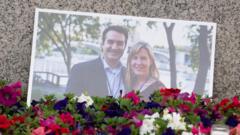In a landmark decision, a Tokyo court has ruled to dissolve the Japanese branch of the Unification Church, years after it became embroiled in controversy following the assassination of Shinzo Abe, Japan's former prime minister.
**Japanese Court Orders Dissolution of Unification Church After Abe Assassination**

**Japanese Court Orders Dissolution of Unification Church After Abe Assassination**
The disbanding of the controversial group is a significant verdict following the investigation into its financial practices and ties to politics.
On March 25, 2025, the court granted the government's request for the church's legal dissolution, stating it breached laws concerning religious conduct. This follows substantial allegations that the church exploited its followers financially to support political figures. An inquiry by the education ministry, which oversees religious organizations, revealed testimonies from approximately 1,550 ex-members who reported losses amounting to 20.4 billion yen, equivalent to around $140 million, due to forced donations and purchases of church-related items.
The church, recognized for mass wedding ceremonies and originally founded in South Korea by Rev. Sun Myung Moon in 1954, has drawn particular scrutiny since Abe's assassination in July 2022. The shooter, Tetsuya Yamagami, attributed the dire financial situation of his mother, a church member, as a primary motive for the attack, claiming it had bankrupted their family. Yamagami, who has confessed to the act, is currently awaiting trial.
This judicial action follows sustained fallout from Abe's tragic death, which revealed underlying issues surrounding the church's operations and influence within Japan's political sphere.
The church, recognized for mass wedding ceremonies and originally founded in South Korea by Rev. Sun Myung Moon in 1954, has drawn particular scrutiny since Abe's assassination in July 2022. The shooter, Tetsuya Yamagami, attributed the dire financial situation of his mother, a church member, as a primary motive for the attack, claiming it had bankrupted their family. Yamagami, who has confessed to the act, is currently awaiting trial.
This judicial action follows sustained fallout from Abe's tragic death, which revealed underlying issues surrounding the church's operations and influence within Japan's political sphere.





















